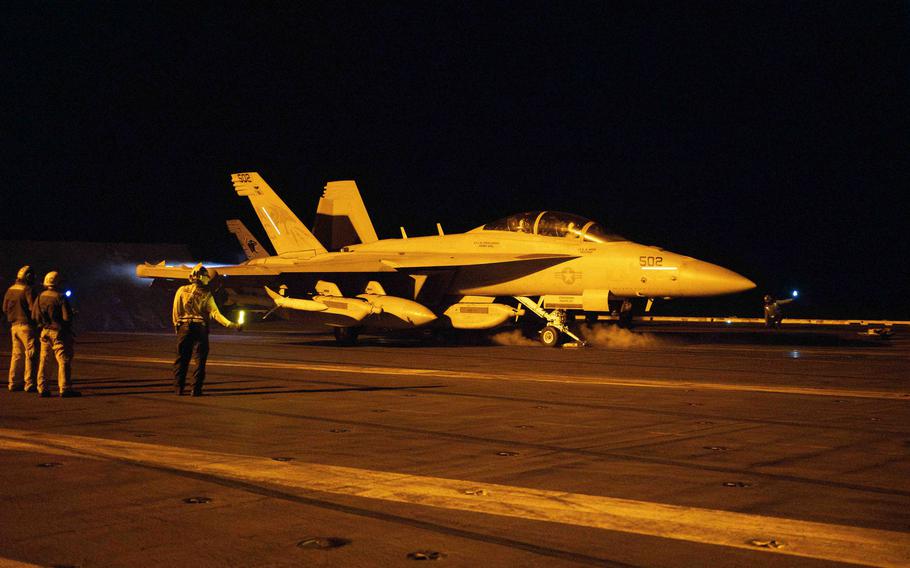
A U.S. fighter prepares to take off from the USS Dwight D. Eisenhower on Jan. 12, 2024, to conduct strikes against sites used by Iranian-backed Houthi rebels in Yemen. (Zachary Elmore/U.S. Navy)
WASHINGTON — Several senators on Tuesday said the White House must seek congressional approval for ongoing U.S. airstrikes against Houthi rebels in Yemen, dismissing claims by the Pentagon that its actions are properly authorized.
Senior members of the Senate Foreign Relations Committee said the military operations that began in January to protect shipping in the Red Sea from attacks by the Iran-backed militants are now beyond President Joe Biden’s limited war powers.
Sen. Chris Murphy, D-Conn., the chairman of the committee’s Middle East subpanel, said he will be discussing legislation in the coming days to provide congressional authorization.
“This looks to me like war in every bit of the constitutional sense: We have engaged in multiple rounds of strikes, we have a limited number of boots on the ground, we have taken casualties, we have prisoners,” Murphy said. “I’m having a hard time understanding why this does not require a traditional congressional war authorization.”
Sen. Ben Cardin, D-Md., chairman of the full Senate Foreign Relations Committee, and Sen. Todd Young, R-Ind., agreed.
The White House has characterized the strikes as self-defense and said President Joe Biden is within the legal scope of his authorities as commander in chief. Only Congress can authorize war under the Constitution but the White House has the right to launch limited foreign military action.
Daniel Shapiro, the deputy assistant secretary of defense for the Middle East, said Tuesday during the Senate hearing that the Pentagon feels “very strongly” that Biden is carrying out the Yemen campaign with proper authorities. He also said the constitutional power granted to Biden to act in self-defense also applies to U.S. partners.
Senators were not convinced.
“Self-defense means you can defend U.S. personnel, you can defend U.S. military assets, you probably can defend U.S. commercial ships,” said Sen. Tim Kaine, D-Va. “If you’re defending the commercial ships of other nations, it is in my view, laughable to call that self-defense.”
Murphy said the extension of the self-defense authority to the protection of partners was a “very troubling and creative interpretation” of the Constitution.
The U.S. plays a leading role in a coalition of more than 20 countries assembled in December to patrol the Red Sea and safeguard commercial shipping after the Houthis began attacking vessels transiting the key shipping route in the Middle East in November.
Strikes led by the U.S. and the United Kingdom have so far hit more than 230 targets in Yemen, “likely destroying hundreds of Houthi weapons,” according to Shapiro. The most recent strike on Saturday targeted underground weapons storage facilities, drones, air defense systems, radars and a helicopter, he said.
But the air campaign has failed to deter the Houthis, who have said they will keep up their attacks as long as Israel continues its war against Hamas militants in the Gaza Strip.
Shapiro and some senators on Tuesday doubted the Houthis were acting out of solidarity for the Palestinians in Gaza, noting most of the attacked ships have no connection to Israel. Others were not so certain.
“Isn’t it a fact that the Houthi attacks on shipping went down significantly during the period of the humanitarian pause in November?” Sen. Chris Van Hollen, D-Md., asked about a brief cease-fire in Gaza.
Shapiro acknowledged a decline in attacks during that time but said there have been “spikes and valleys” in Houthi activity so “I don’t know to what we can attribute that.”
The hearing Tuesday was interrupted several times by protestors calling for another cease-fire in Gaza. Several activists held up hands covered in red paint.
Israel’s war with Hamas following the Oct. 7 rampage in Israel that killed 1,200 people and saw 250 others taken hostage has inflamed tensions in the Middle East and intensified threats to U.S. service members.
Three soldiers were killed and dozens more were injured last month in an Iran-linked drone strike in Jordan. Two Navy SEALs died in rough waters off the coast of Somalia in January during a mission to intercept Iranian-made weapons being shipped to Yemen.
Shapiro said the Pentagon hoped to “restore stability and deescalate tensions in the region very soon” but would keep hitting the Houthis until the militants stop their attacks in the Red Sea.
“We clearly have not seen that yet,” he said. “We have to make very clear to them and of course to Iran, their supporters and sponsors, that this must end and we’ll continue to take action until it comes to an end.”